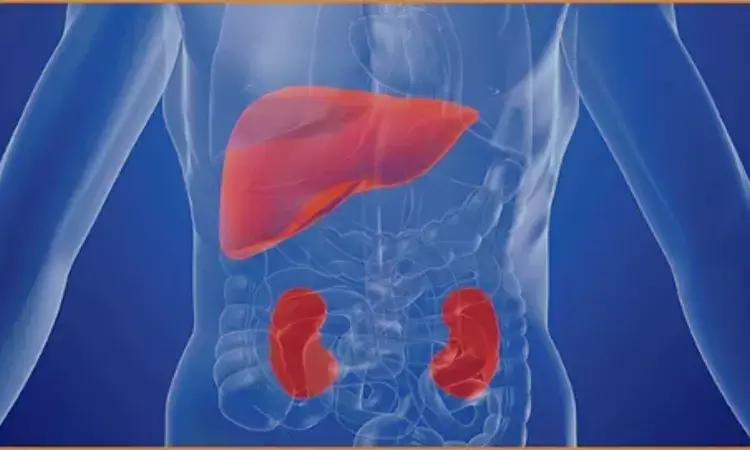- Home
- Medical news & Guidelines
- Anesthesiology
- Cardiology and CTVS
- Critical Care
- Dentistry
- Dermatology
- Diabetes and Endocrinology
- ENT
- Gastroenterology
- Medicine
- Nephrology
- Neurology
- Obstretics-Gynaecology
- Oncology
- Ophthalmology
- Orthopaedics
- Pediatrics-Neonatology
- Psychiatry
- Pulmonology
- Radiology
- Surgery
- Urology
- Laboratory Medicine
- Diet
- Nursing
- Paramedical
- Physiotherapy
- Health news
- Fact Check
- Bone Health Fact Check
- Brain Health Fact Check
- Cancer Related Fact Check
- Child Care Fact Check
- Dental and oral health fact check
- Diabetes and metabolic health fact check
- Diet and Nutrition Fact Check
- Eye and ENT Care Fact Check
- Fitness fact check
- Gut health fact check
- Heart health fact check
- Kidney health fact check
- Medical education fact check
- Men's health fact check
- Respiratory fact check
- Skin and hair care fact check
- Vaccine and Immunization fact check
- Women's health fact check
- AYUSH
- State News
- Andaman and Nicobar Islands
- Andhra Pradesh
- Arunachal Pradesh
- Assam
- Bihar
- Chandigarh
- Chattisgarh
- Dadra and Nagar Haveli
- Daman and Diu
- Delhi
- Goa
- Gujarat
- Haryana
- Himachal Pradesh
- Jammu & Kashmir
- Jharkhand
- Karnataka
- Kerala
- Ladakh
- Lakshadweep
- Madhya Pradesh
- Maharashtra
- Manipur
- Meghalaya
- Mizoram
- Nagaland
- Odisha
- Puducherry
- Punjab
- Rajasthan
- Sikkim
- Tamil Nadu
- Telangana
- Tripura
- Uttar Pradesh
- Uttrakhand
- West Bengal
- Medical Education
- Industry
Preserving good cardiovascular health lowers the risk of mortality and MAFLD: Study

A new study published in the journal of Nature Scientific Reports showed that high Life's Essential 8 (LE8) scores were related to a 90% reduction in cardiovascular mortality, a 58% reduction in all-cause mortality, and an 89% reduction in the risk of metabolic dysfunction-associated fatty liver disease (MAFLD) in overweight and obese people.
About 70% of those who are overweight or obese have MAFLD, compared to 25% of the overall population. MAFLD is the most prevalent liver disease in obese people, and it can lead to more serious liver diseases like cirrhosis, liver fibrosis, and non-alcoholic steatohepatitis (NASH). The American Heart Association unveiled Life's Essential 8 (LE8), a new cardiovascular health index, in 2022.
Its precursor, LE7, has shown preventive benefits against cardiovascular and other chronic illnesses, making it a valuable tool for primary prevention in healthcare systems. This study examined the mediating roles of inflammation and insulin resistance in the association between the Life's Essential 8 (LE8) and MAFLD, all-cause, and cardiovascular mortality in various groups.
Data from the National Health and Nutrition Examination Survey (NHANES, 2007–2018), which included 6,885 overweight and obese people, were utilized in this retrospective investigation. There were three categories for LE8 scores: low, medium, and high. The associations between LE8, MAFLD, and mortality were evaluated using Cox proportional hazards models and weighted logistic regression.
The highest LE8 group in Model 3 had an 89% lower prevalence of MAFLD than the lowest group (OR = 0.11). 72% of this impact was mediated by HOMA-IR, whereas 3–12% was mediated by inflammatory indicators such as CRP, hs-CRP, SII, and SIRI. In Kaplan-Meier analysis, higher LE8 scores were associated with considerably improved survival and 58% lower all-cause and 90% lower cardiovascular mortality.
5–17% of the mortality impacts were mediated by inflammatory indicators. The LE8–MAFLD connection was non-linear, according to Restricted cubic spline (RCS) curves. In subgroups, LE8 interacted with age. SIRI predicted death, but HOMA-IR accurately predicted MAFLD. Higher LE8 scores decreased the risk of MAFLD and mortality in overweight/obese persons.
Overall, these results emphasize the value of primary preventive measures meant to preserve good cardiovascular health, which can dramatically lower the risk of death and the prevalence of MAFLD, especially in those who are overweight or obese.
Source:
Zhang, W., Zou, M., Liang, J., Zhang, D., Zhou, M., Feng, H., Tang, C., Xiao, J., Zhou, Q., Yang, W., Tan, X., & Xu, Y. (2025). Association of cardiovascular health with MAFLD and mortality in overweight and obese adults and mediation by inflammation and insulin resistance. Scientific Reports, 15(1), 18791. https://doi.org/10.1038/s41598-025-03820-z
Dr Prem Aggarwal, (MD Medicine, DNB Medicine, DNB Cardiology) is a Cardiologist by profession and also the Co-founder and Chairman of Medical Dialogues. He focuses on news and perspectives about cardiology, and medicine related developments at Medical Dialogues. He can be reached out at drprem@medicaldialogues.in


